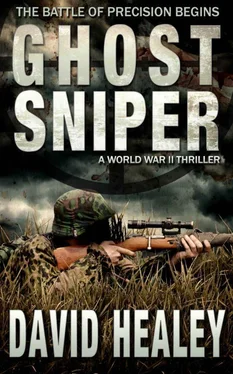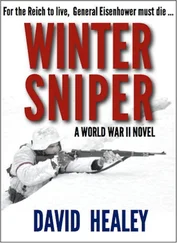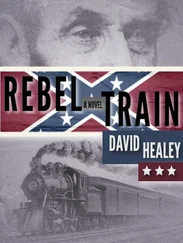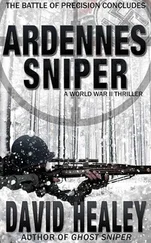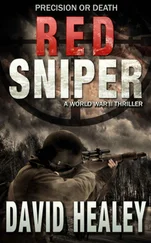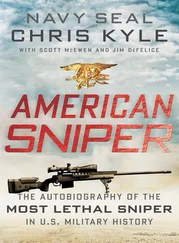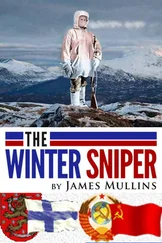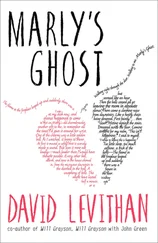The snipers moved into the village itself. Everywhere they looked, the American troops were scrambling to set up defensive positions, using wooden carts, even mattresses and tables to create firing positions at the street corners. Some were busy rigging so-called “sticky bombs” to use against the Panzers that would surely be there by morning. A few soldiers occupied second or third floor windows, getting ready with grenade launchers. The thick stone walls made each house a fortress in its own right.
Mulholland reported to the captain in charge, who agreed that the snipers should be placed wherever Mulholland thought best.
“All right, listen up, here’s our plan,” Lieutenant Mulholland said. “Neville, I want you to position yourself and your Tommy gun in one of the upstairs windows near the edge of the town. That will add some firepower to what’s already covering the road into the village. The Germans will likely be coming out of the south, so Vaccaro, you get yourself up on one of the rooftops. The higher up, the better, because you’ll have a longer field of fire. You start trying to pick off Germans as soon as they come into sight. Cole and I will go up into the church tower, which is the highest point in the village.”
“What about me?” Jolie asked.
“There’s a hospital set up in the church,” he said. “Maybe you and Fritz can help.”
They made their way over to the church, which was by far the largest structure in the village. The massive stonework and squat architecture gave the church a brooding appearance, and the square gray tower at one end of the church resembled a castle keep more than a steeple.
The church doors were open, and they started inside, but were stopped by a young man wearing a red and white medic armband. His uniform was spattered with blood. “No guns in the church,” he said. “This is neutral territory, sir.”
“All right,” Mulholland said. “I can’t argue with that. It is a church, after all.”
“Thank you, sir.”
They left their weapons behind and the young medic led them inside. After the bright light of the French countryside, it took a while for their eyes to adjust to the dark interior, lit only by the sunlight through the tall, narrow windows that were little more than slits in the deep stone walls. The air was cool, and smelled of rubbing alcohol and unwashed bodies. The pews were being used as hospital beds, and in many places blood had soaked into the ancient wood. It soon became apparent that Germans and Americans were among the wounded. Mulholland looked around, and saw that several of the other medics—marked by their white arm bands with medical crosses—were Germans.
“You’ve got Jerries in here?”
“Yes, sir. Our own boys and Jerries, along with a couple of French civilians who got caught in the crossfire. I guess technically the Germans are prisoners of war, but we’ve called a truce to help the wounded. You know, I was their prisoner at first because my parachute came down almost in the middle of the town, when the Germans still had control of it. They treated me all right. One of these Germans is a doctor, and he really knows what he’s doing. There would be a lot more dead without him.”
“Word has it that the Germans might try to take back this town in the morning,” Mulholland said. He nodded at the massive double doors that opened toward the steps leading into the church tower. “Defensive positions are being set up outside. I want to set up a sniping post in the church steeple.”
“Sir, you’re an officer, so I suppose I can’t tell you what to do, but the fact is that if you start shooting from that steeple, the Jerries are going to hit back, maybe with mortars, maybe with Tiger tanks. They’ll turn this place into rubble. With all due respect, sir, is that really what you want with all these wounded men in here?”
Mulholland took a moment to look around the interior of the church. Fritz moved among the wounded, speaking with them in German. The German doctor heard him, waved him over, and set him to work helping bandage a leg. Jolie kneeled beside a girl, no more than eight or nine, who lay wounded on one of the church pews.
“I suppose you’re right,” Mulholland said. “I’ll leave the woman and the German with you. That’s two extra pairs of hands.”
“Thank you, sir.”
Mulholland turned to Cole. “OK, there’s a lot of hours between now and dawn. Get something to eat, get some sleep, and then we’ll get into position before sunrise. Obviously, the church steeple is now off limits, so we’ll have to find ourselves a roof top.”
“I reckon there’s plenty of roof tops,” Cole said. He smiled. “Plenty of Jerries to shoot, too, once that sun comes up.”
• • •
Jolie waited until dark, then stole a bicycle and peddled toward the chateau that now served as Wehrmacht headquarters. At first, she tried to be stealthy, but that seemed ridiculous to attempt on a bicycle when every rut and pot hole sent the machine rattling like a bucket of bolts.
It was hard to tell if she was riding through territory held by the Germans or by the Americans—at night, with trigger happy and exhausted soldiers everywhere, running into troops from either side would be equally dangerous.
If anyone stopped her, she planned to pose as a French girl on a desperate errand—a sick relative perhaps. The Americans might stop her, but the Germans would be more wary. With luck, any German sentries she came across wouldn’t shoot her.
Fortunately, the small lanes she kept to were deserted except for the occasional owl, fox or rabbit.
Jolie knew these roads well. She had grown up in Normandy, of course, but it was her role in the French Resistance that had truly taught her the best routes to travel the bocage by night, undiscovered.
The Allied invasion had been long awaited by Jolie and the other French maquis . She recalled the grim days of June 1940 when the Germans had arrived. She had watched in disbelief as the truckloads of German troops drove in with their square steel helmets and harsh, guttural orders. German was truly a soldier’s language.
Many French had accepted the Germans with a grudging shrug. For the most part, the Germans were easy to get along with—unless you happened to be a Jew. All of the Jews in Normandy were quickly rounded up, never to be seen again.
There were some French, like Jolie, who would not give up so easily—at least not in their hearts. This became the French Resistance and she had quickly joined. There had been nighttime raids on supply trains and radio centers. Small groups of soldiers traveling at night might not reach their destination.
But the Germans made the French pay dearly for these acts of rebellion and the maquis soon limited operations to gathering intelligence for the Allied invasion to come. They bided their time.
Jolie’s first real lover was a young Resistance fighter named Charles. He was tall and had dark, Gallic good looks. He took terrible chances on missions, yet he was shy in bed. She still recalled the feel of his skin against hers—there was no better feeling in the world.
He was captured one night while counting gun batteries at the beach. The Germans shot him in the courtyard of the very chateau she was riding toward tonight.
Jolie had gone with some women of the village to collect the body. She never cried for Charles. They both knew what they were doing was dangerous, and Charles had paid the ultimate price.
Thinking about Charles, Jolie peddled harder, until her heart raced. She was beyond tears for her handsome lover, dead at the hands of the German occupiers. What Jolie craved now was revenge.
After escaping the woods, toward nightfall Von Stenger returned to the chateau in hopes of some food and rest. In the room that he had shared with Wulf and the boy, there were now three enlisted men. They lounged on the battered furniture, resting their muddy boots on the upholstered chairs. He mused that one didn’t need bombs to destroy buildings, just soldiers.
Читать дальше
